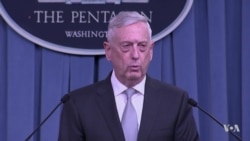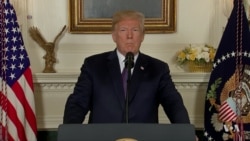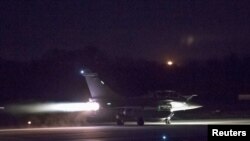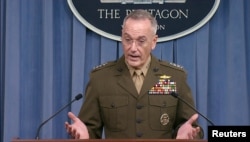Moments after President Donald Trump concluded his seven-minute broadcast Friday announcing the start of precision airstrikes on Syrian government facilities associated with the development of chemical weapons, loud explosions shook Damascus.
Among the sites struck in a coordinated operation by U.S., French and British forces shortly before dawn prayers was a scientific research center on the outskirts of the Syrian capital, a chemical weapons storage facility near Homs and a nearby command post, the Pentagon said.
There were also reports by political activists that the Syrian Army’s 4th Armored Division, an elite formation commanded by President Bashar al-Assad’s brother, Maher al-Assad, as well as the Republican Guard, were also hit in the strikes. But it remains unclear if they were struck by French and British manned aircraft and cruise missiles rather than by the U.S. military.
From the point of view of those on the receiving end of the one-night operation, the military retaliation by the Western powers may have seemed anything but restrained.
Restrained strike
The strike, intended to show Western resolve in the face of what Trump called persistent violations of international law by Assad, was larger than last year’s, when the United States fired 58 cruise missiles at Syria in retaliation for a purported chemical weapons attack by government forces on a rebel-held town in the north of the country.
This time about twice the number of cruise missiles were launched by the United States in response to last Saturday’s alleged chemical attack by Assad on the town of Douma just outside of Damascus, in which at least 40 people died and hundreds were sickened.
But the coordinated strike, which included missiles fired from fixed-wing aircraft as well as from warships, has left some analysts puzzled, questioning the limited nature of the punitive raid.
“To many people’s surprise this was somewhat limited. We were expecting at least more airfields, ground force and naval bases to come under attack,” said Arash Aramesh, a national security and foreign policy analyst.
WATCH: U.S. Defense Secretary Mattis Briefs Reporters in Syria Strikes
Speaking in Washington as the operation was close to concluding, U.S. Defense Secretary James Mattis appeared somewhat at pains to explain what the objective had been, saying it focused on degrading the Syrian government’s chemical weapons program only.
“We confined it to the chemical weapons-type targets. We were not out to expand this, we were very precise and proportionate, but at the same time it was a heavy strike,” he said.
In London, Britain’s Theresa May also emphasized that the retaliation was focused on Assad’s chemical weapons and ensuring a stop to the “erosion of the international norm that prevents the use of these weapons.” In a television broadcast, May said: “This is not about intervening in the civil war. This is not about regime change.”
She added: “It is about a limited and targeted strike that does not further escalate tensions in the region and that does everything possible to prevent civilian casualties.”
WATCH: President Trump Announces Strikes Against Syria
Too limited to deter?
Some critics question whether the scale of the reprisal may have been too limited to act as a deterrent. Asked whether he could guarantee Assad wouldn’t use deadly poisons again, Mattis told reporters at the Pentagon, “nothing is certain in these kind of matters.”
U.S. officials later highlighted Trump’s statement that the three Western allies were willing “to sustain this response until the Syrian regime stops its use of prohibited chemical agents.”
For Steven Bucci, a former senior Pentagon official and a visiting fellow at the Heritage Foundation, a Washington-based think tank, the U.S. president was “sending a message that this isn’t just firing and forgetting and everyone drives home. Clearly, he’s prepared to continue this for some length of time.”
Bucci believes the retaliation has the potential to force Assad to forgo the use of chemical weapons.
“It appears from very initial reports that we’re hitting some very specific targets and facilities that seem to be connected to the production, development, and usage of chemical weapons,” he said. “What may change Assad’s behavior is removing the tools with which he’s been using these horrible things. That’s kind of what you have to do — you can’t just stomp your feet and wag your finger. You have to force him to stop.”
PHOTOS: US, France and Britain Hit Syrian Chemical Facilities
Republican Senator John McCain also highlighted the promise of sustainability. He said: “the United States and our allies have the will and capability to continue imposing those costs, and that Iran and Russia will ultimately be unsuccessful in protecting Assad from our punitive response.”
There were concerns before the punitive strike of a Russian military response. Earlier this week Russian officials warned their forces in Syria would shoot down Western missiles and may even target the planes and ships launching them. On Thursday, a senior Russian official started to walk back that threat, saying the Kremlin would protect Russian personnel on the ground.
That message appeared to have been heard in Washington.
Joint Chiefs of Staff chairman, General Joseph Dunford, who took part in the briefing about the raids alongside Mattis, said the targets had been chosen to “mitigate the risk of Russian forces being involved.” Dunford said “normal deconfliction channel was used to deconflict airspace” with Moscow, but that the United States did not share with Russia what sites would be targeted.
Neither Washington nor Moscow want to see an escalation of the overall long-running conflict in Syria, say analysts. Trump has already indicated he would like to withdraw the estimated 2,000 U.S. ground troops in northern Syria, where they’ve been assisting Syrian Kurds to defeat Islamic State militants.
“We’ll be coming out of Syria very soon. Let the other people take of it now,” the U.S. leader said earlier this month.
On a cost-benefit analysis the Kremlin has more to lose from any escalation — or a prolonging of the 7-year-old, multisided Syria conflict now that their longtime ally Assad, thanks to Russian and Iranian military assistance, has swung the battlefield decidedly in his favor and has all but won the civil war. Any major escalation risks reversing the military dynamic, say analysts.
Reactions
Hours after the strikes, Russian President Vladimir Putin issued a statement condemning the military strikes, accusing Washington of launching "an aggression against a sovereign state which is at the forefront of the fight against terrorism." Putin said that the strikes were not sanctioned by the U.N. Security Council, and were carried out "in violation of the U.N. charter and principles of international law."
And he warned strikes would have a "a devastating impact on the whole system of international relations."
Kremlin officials claimed that Russian-supplied Syrian air defense systems intercepted 71 of the 103 Cruise missiles that were launched. But the Russian Defense Ministry said none of its own air defense units were involved as none of the missiles launched by the U.S., France and Britain entered Russian air defense zones around the naval port of Tartus or the air base at Khmeimim, the main facilities used by Russian forces in Syria.
The U.S. ambassador to Russia, Jon Huntsman, said the Western powers did everything they could to ensure there were no Russian casualties, saying the Kremlin was warned ahead of the strikes on Syria, a move emphasizing, he said, that the military action was not about "conflict between superpowers. Before we took the action, the United States communicated with the Russian Federation to reduce the danger of any Russian or civilian casualties," said Huntsman in a video posted on Facebook.
William Gallo contributed to this article.










